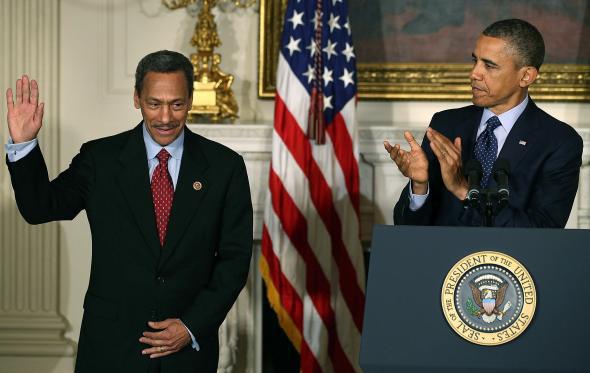The U.S. Senate confirmed two nominees today, one (Patricia Millett) for the D.C. Circuit court and one (Mel Watt) for a housing policy job in the administration.* These nominations had been “controversial” for months. They went through with no fanfare at all; the political world seemed more distracted by the question of whether President Obama was wrong to take a selfie at Nelson Mandela’s memorial event.
But the lack of drama was, in itself, a story. Ever since senators (on both sides) started discussing a change to the nomination cloture process, the minority has warned that doing so would bring about the apocalypse. In 2005 the Washington Post reported that “Senate Democrats are vowing a scorched-earth response, noting that a single senator can dramatically slow down the chamber’s work by insisting on time-consuming procedures that are normally bypassed by ‘unanimous consent.’ ” Just last week, Time magazine warned of a “guerilla war” to come.
The Senate has a heavy schedule between now and the end of the year: Budget Committee negotiators must find a deal to avoid another government shutdown in January, the Farm Bill is still pending, as is the annual National Defense Authorization Act. Not to mention a host of nominations. And while Democrats may have an easier time with floor approval given the new rules, they still have to contend with other obscure procedural provisions, like blue slipping, where home state senators can effectively veto a judicial nominee. All except one of Obama’s pending federal-court nominees hail from states that have at least one Republican Senator. Democrats will have to scramble to figure out where and when Republicans might strike.
And yet the first post-nuclear votes have been pretty … boring. Republicans used almost none of the tools available to them to stop these nominees. They did invoke the rarely used rule against holding committee meetings beyond the first two hours of a Senate day, but that’s “rarely used,” not a new tactic—and it was done to screw with an IRS nomination that was going to be sticky anyway.
“They did throw in an extra vote,” said Sen. Jeff Merkley, “but this went very smoothly, as it should. “People are so fatigued with the dysfunction of the Senate. If we can spent less time on nominees and more time on legislation, that would be very positive in the eyes of the American people.”
*Correction, Dec. 10, 2013: This post originally misspelled Patricia Millett’s last name.
